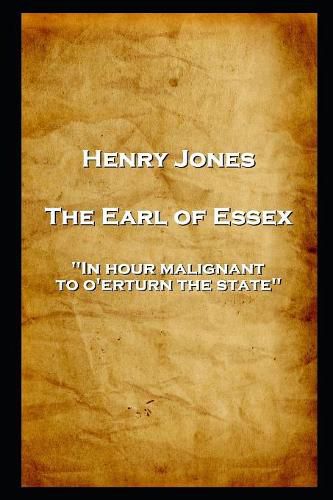Henry Jones - The Earl of Essex: 'In hour malignant, to o'erturn the state
Henry Jones

Henry Jones - The Earl of Essex: ‘In hour malignant, to o'erturn the state
Henry Jones
Henry Jones was born at Beaulieu, near Drogheda, County Louth, Ireland in 1721. His working life began when he was apprenticed to a bricklayer. Jones, however, was keen to better himself and studied hard in his private time. He fashioned some complimentary verses, addressed to the corporation of Drogheda and together with some lines ‘On Mr. Pope’s Death’, managed to attract the attention of Lord-chief-justice Singleton, who lived at Beaulieu.
In 1745 he obtained employment at the parliament house at Dublin. Jones, used the position to promote his literary talents and celebrated the arrival of Lord Chesterfield as lord-lieutenant of Ireland in a poem that was then presented to Chesterfield by Singleton.
Chesterfield asked Jones to accompany him on his return to London in 1748. There, he and his friends helped Jones to publish, by subscription, ‘Poems on Several Occasions’ in 1749, which delivered a handsome profit for the young poet.
Jones is though more noted as a dramatist and that, primarily, is due to his tragedy, ‘The Earl of Essex’ which he completed in 1752. Chesterfield introduced both the play and Jones to Colley Cibber, the Poet Laureate, who then introduced Jones to the manager of Covent Garden Theatre. Cibber would later attempt to secure the laureateship for Jones after his own death.
‘The Earl of Essex’, after being revised by Chesterfield and Cibber, was premiered at Covent Garden on 21st Feb. 1753, and played for seventeen sold-out nights. It was a triumph, and was equally well received in Dublin and then later in the provinces. It brought Jones over GBP500, a large sum even by today’s standards. The play was printed soon after its production, and eventually sold through four editions.
The success, unfortunately, was to be the ruin of Jones. His drunken habits, indolence, raw manners, and harshly arrogant temper appalled most of his patrons who soon withdrew their support. However, he seemed adept at keeping on good terms with Chesterfield for some years longer, but at length even he gave up on the relationship when Jones borrowed money from his servant.
Jones did continue to write and had made progress on a tragedy entitled ‘Harold, ’ and, on that thin security, managed to raise money as an advance from booksellers.
He was rather more successful in his revelries with the acting profession. Jones continued to be on friendly terms with many of the leading actors although in his often drunk state he would harangue the more minor actors as ‘parrots’, but he repaid them with puffs and panegyrics. His charm and ease with a few lines were valuable commodities.
Whenever he was an inmate of sponging-houses he contrived to flatter any bailiff’s daughter or wife with verses on their beauty or talents, and, in the process, secured himself more comfortable quarters than he perhaps deserved.
Henry Jones died in the parish workhouse in April 1770.
After his death, Reddish, the actor of Drury Lane, acquired Jones’s manuscripts, which included ‘Harold’ and three acts of an unfinished tragedy, ‘The Cave of Idra.’ This was completed by Paul Hiffernan, and re-titled ‘The Heroine of the Cave, ’ was produced for Reddish’s benefit on 25th March 1774.
This item is not currently in-stock. It can be ordered online and is expected to ship in approx 2 weeks
Our stock data is updated periodically, and availability may change throughout the day for in-demand items. Please call the relevant shop for the most current stock information. Prices are subject to change without notice.
Sign in or become a Readings Member to add this title to a wishlist.


